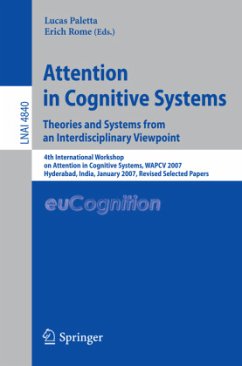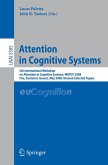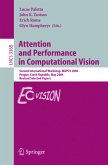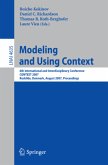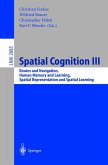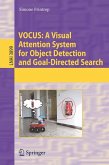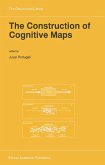This volume provides a much-needed interdisciplinary angle on the subject of attention in cognitive systems. It constitutes the thoroughly refereed post-workshop proceedings of the 5th International Workshop on Attention in Cognitive Systems, held in Hyderabad, India, in January 2007. The 31 papers are organized in topical sections that cover every aspect of the subject, from the embodiment of attention and its cognitive control, to the applications of attentive vision.
Attentionhasbeenrepresentingacorescienti?ctopicinthedesignofAI-enabled systems within the last decades. Today, in the ongoing debate, design, and c- putationalmodelingofarti?cialcognitivesystems,attentionhasgainedacentral position as a focus of research. For instance, attentional methods are considered in investigating the interfacing of sensory and cognitive information processing, for the organization of behaviors, and for the understanding of individual and social cognition in re?ection of infant development. Whilevisualcognitionplaysacentralroleinhumanperception,?ndingsfrom neuroscience and experimental psychology have provided strong evidence about theperception-actionnatureofcognition.Theembodiednatureofsensory-motor intelligence requires a continuous and focused interplay between the control of motor activities and the interpretation of feedback from perceptual modalities. Decision making about the selection of information from the incoming sensory stream - in tune with contextual processing on a current task and an agent's global objectives - becomes a further challenging issue in attentional control. Attention must operate at interfaces between bottom-up driven world int- pretation and top-down driven information selection, thus acting at the core of arti?cial cognitive systems. These insights have already induced changes in AI-related disciplines, such as the design of behavior-based robot control and the computational modeling of animats. Today, the development of enabling technologiessuch as autonomous robotic systems,miniaturizedmobile-evenwearable-sensors,andambientintelligence systems involves the real-time analysis of enormous quantities of data. These data have to be processed in an intelligent way to provide "on time delivery"of the required relevant information. Knowledge has to be applied about what needs to be attended to, and when, and what to do in a meaningful sequence, in correspondence with visual feedback.
Attentionhasbeenrepresentingacorescienti?ctopicinthedesignofAI-enabled systems within the last decades. Today, in the ongoing debate, design, and c- putationalmodelingofarti?cialcognitivesystems,attentionhasgainedacentral position as a focus of research. For instance, attentional methods are considered in investigating the interfacing of sensory and cognitive information processing, for the organization of behaviors, and for the understanding of individual and social cognition in re?ection of infant development. Whilevisualcognitionplaysacentralroleinhumanperception,?ndingsfrom neuroscience and experimental psychology have provided strong evidence about theperception-actionnatureofcognition.Theembodiednatureofsensory-motor intelligence requires a continuous and focused interplay between the control of motor activities and the interpretation of feedback from perceptual modalities. Decision making about the selection of information from the incoming sensory stream - in tune with contextual processing on a current task and an agent's global objectives - becomes a further challenging issue in attentional control. Attention must operate at interfaces between bottom-up driven world int- pretation and top-down driven information selection, thus acting at the core of arti?cial cognitive systems. These insights have already induced changes in AI-related disciplines, such as the design of behavior-based robot control and the computational modeling of animats. Today, the development of enabling technologiessuch as autonomous robotic systems,miniaturizedmobile-evenwearable-sensors,andambientintelligence systems involves the real-time analysis of enormous quantities of data. These data have to be processed in an intelligent way to provide "on time delivery"of the required relevant information. Knowledge has to be applied about what needs to be attended to, and when, and what to do in a meaningful sequence, in correspondence with visual feedback.

